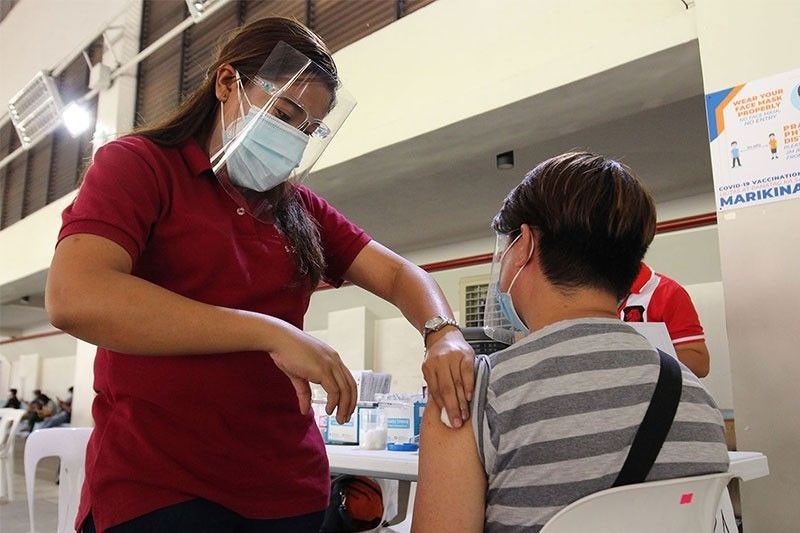Governors, mayors get vaccine priority

MANILA, Philippines — Local chief executives or LCEs in the country will now be among the A1 priority list for vaccination.
The League of Cities of the Philippines (LCP) said its appeal to reclassify LCEs to be part of the priority A1 group for the national vaccination program was approved on May 15.
LCEs, including governors and city mayors, will be listed under priority group A1.5, following Advisory No. 40 by the chair of the National COVID-19 vaccination operations center, Health Undersecretary Myrna Cabotaje said over the weekend.
LCP national president and Bacolod City Mayor Bing Leonardia said LCEs will be included in the A1 priority list as they head the Local Health Board and chair the Local Task Force Against COVID-19.
“Such a move recognizes the important role of LCEs in the success of the country’s vaccination program. We commit to reciprocate the trust and confidence of the IATF (Inter-Agency Task Force for the Management of Emerging Infectious Diseases) to city mayors with more active and responsive vaccination efforts in our respective localities,” Leonardia said in a statement.
With the advisory, the country’s 1,634 provincial governors and city and municipal mayors will be prioritized for vaccination.
Mayors and governors – but only in critical or high-risk areas – were included in the priority list last month.
The LCP had been lobbying for priority vaccination for city mayors since the start of the vaccination program.
The Department of the Interior and Local Government (DILG) is probing more than a dozen local officials who jumped the vaccine priority line in March.
The DILG said mayors and other local officials who jumped the line that prioritized healthcare workers may face administrative charges before the Office of the Ombudsman if the DILG finds probable cause.
Herd immunity
In separate statements, Senate Majority Leader Juan Miguel Zubiri, and Senators Sherwin Gatchalian and Bong Go stressed the importance of achieving herd immunity with the vaccination of some 70 million Filipinos by yearend so the economy can rebound from its longest recession in recent history.
Zubiri said the IATF can immediately start the vaccination of economic and government frontliners, categorized as A4 in the priority list, noting that the bulk of vaccines remain in cold storage while local government units (LGUs) have been reporting that people under the A1 to A3 categories seeking to be vaccinated are now starting to dwindle.
“The more, the merrier,” Zubiri told dzBB. It’s time that we open them (vaccination) up for the next level in the priority list, our A4 frontliners – our essential economic workers – like sales and food personnel, and our uniformed personnel. They’re the ones exposed.”
The government’s vaccination rollout, which began last February, is currently serving frontline health workers (A1), senior citizens (A2), and persons with comorbidities (A3). The National Task Force Against COVID-19 said those in the A4 priority group can be inoculated by June depending on the country’s vaccine supply. The vaccination of the general population is also expected to begin by August.
The country has so far received over seven million doses of CoronaVac (Sinovac), AstraZeneca, Sputnik V, and Pfizer-BioNTech—all two-dose vaccines. Only around 2.02 million people have received at least a single dose so far, with just over five hundred thousand receiving the full two doses.
The country is currently averaging 50,000 to 60,000 vaccinations a day.
Gatchalian said vaccinating more people will boost confidence on the resumption of face-to-face classes in low-risk areas, noting that basic education frontliners are part of the A4 priority group.
Gatchalian, who chairs the Senate committee on basic education, said suppressing the spread of the virus is the best way to assure parents and learners of their safety following the surge of infections last March.
Go also called for speedy vaccinations, as he expressed optimism that the country will be able to vaccinate 50 million people by September and reach 70 million by the end of the year.
In a radio interview on Saturday, Go stressed the importance of maintaining discipline and continuing to follow the health and safety protocols in order to contain the pandemic while government proceeds with its vaccination campaign.
“If we won’t exercise discipline, (COVID-19) cases will again go up,” Go said in Filipino even as he cited the case of India, the world’s biggest vaccine manufacturer, and now the second highest in terms of infections globally.
“As long as we have not achieved herd immunity, let’s not be complacent,” he said.
Health reform advocate Dr. Anthony Leachon suggested to the IATF some easy-to-do measures to ramp up vaccinations, especially that AstraZeneca vaccines are expiring starting next month.
Leachon said the IATF must check LGUs’ capacity to vaccinate their constituents and have them commit to the numbers.
He said LGUs should also be allowed to switch some vaccination sites with Sinovac to use AstraZeneca, and not make them wait until their Chinese vaccines are depleted before getting the UK-made jabs.
The expert also said covered but well-ventilated parking lots can be used as temporary vaccination – including drive-through – sites.
Leachon said the private sector can easily take up the slack in vaccination given its resources, and the IATF should allow in-work or in-factory inoculations with government supervision.
He said the government can also give the expiring AstraZeneca vaccines to the private sector in exchange for the ones ordered by businesses that are arriving next month.
More for provinces
Vice President Leni Robredo yesterday urged the national government to allocate more COVID-19 vaccines to provinces.
“I hope the distribution of vaccines in provinces will improve,” Robredo said in her weekly program over dzXL.
The Vice President said the government should fast-track the rollout of the vaccines to avoid wastage due to expiration.
Of the more than two million AstraZeneca vaccine doses that the Philippines received from the World Health Organization-led COVAX Facility last weekend, 1.5 million doses will expire on June 30, while 525,600 will expire on July 31.
Robredo also noted that some local government units lack vaccinators.
“Even if you have the supply there’s a danger that it will expire if we are not ready for the rollout,” she said. “We are depriving many people who should receive the vaccines.”
The League of Provinces of the Philippines urged the national government yesterday to send more COVID-19 vaccines to provinces, especially those under the most lenient modified general community quarantine or MGCQ.
The Philippines has so far inoculated over two million people, which is still far from its target of vaccinating 50 to 70 million individuals to reach herd immunity against COVID-19.
Robredo also appealed to residents in the National Capital Region Plus, which was placed under general community quarantine until May 31, as well as those who are fully vaccinated, to remain vigilant against the virus.
She also urged those who belong to priority groups in the vaccination program to register in their respective LGUs.
Robredo said she has already registered online for the vaccination. Robredo, who is hypertensive, belongs to the A3 group or persons with comorbidities.
Vaccinations for PLHIVs
Meanwhile, the Department of Health (DOH) yesterday also urged people living with HIV (PLHIV) to get vaccinated against COVID-19.
But Health Secretary Francisco Duque also advised PLHIVs to secure the necessary medical clearance prior to vaccination.
“As part of the Priority Group A3 (people with comorbidities), DOH encourages PLHIV to seek medical clearance prior to vaccination, and get vaccinated once cleared by their attending physician,” Duque said in a statement.
Under DOH guidelines on COVID-19 vaccination, medical clearance is being required from “immunocompromised individuals” like PLHIVs.
Duque further encouraged the PLHIVs to continue accessing their free HIV treatment and other services, and adhering to the treatment regimen.
“With access to life-saving treatment, HIV can be managed and those afflicted with the disease can lead happy, healthy and normal lives. To our PLHIV, help is always available,” Duque explained.
The health chief assured PLHIVs of free treatment and services even at this time of pandemic. – Paolo Romero, Helen Flores, Mayen Jaymalin
- Latest
- Trending
































